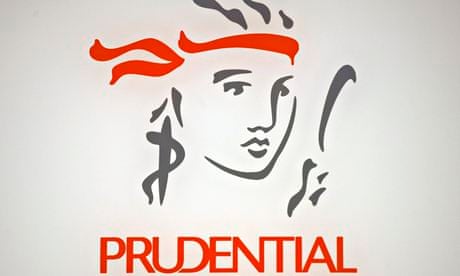An unidentified individual at Prudential received almost £17.5m last year, the insurance company said on Tuesday, in an admission that exposes the size of pay deals on offer outside boardrooms at the UK's financial services companies.
The insurer's annual report showed that the eight directors on its board were paid a total of £47m in 2013 – up sharply from the £38m paid to the top seven executives in 2012.
But to comply with Hong Kong rules – where Prudential's shares are also listed – the insurer had to also provide information about the five highest paid people in its organisation, not just in the boardroom. Three of these individuals were covered by the disclosures about boardroom pay but two – who received £25m in total – were not. One of the two unidentified employees received £17.5m and the other up to £7.6m.
Those in the boardroom are not granted such anonymity. New head of the UK operations Jackie Hunt, who was poached from Standard Life last year, received £3.5m despite having joined the board only in September – including a "one-off relocation payment" of £188,679. This payment was to cover stamp duty and estate agency fees incurred as a result of her move from Edinburgh to London.
Hunt was also handed £800,000 to buy shares in Prudential as well as other payments to cover previous bonuses she would have received from Standard Life.
But Pru's US boss Mike Wells was the highest paid within the boardroom, receiving £11.7m in cash and shares, up 60% from £7.3m the year before and topping the £8.7m for the overall boss, Tidjane Thiam.
Wells benefited from shares under two long-term incentive plans vesting in the same year, the company said – one from the Prudential group and the other from the US business Jackson Life, which the company said was a one-off.
He also received a bigger bonus than Thiam, of £3.4m versus the chief executive's £2.1m.
As well as being a household name in the UK, Prudential also owns the fund management company M&G, one of the biggest investors in the stock market and which in turn polices the pay policies of companies in which it invests.
Michael McLintock, chief executive of M&G, received £6.5m as his £371,000 salary was bolstered by bonuses from two long-term schemes, one of which is linked entirely to the performance of M&G.
Other items in the Prudential annual report showed that Rob Devey, who was replaced by Hunt, received a £378,000 bonus which took his total pay for 2013 to £3.4m after he left on 31 October.
Another board director, Barry Stowe, who is based in Hong Kong, received a £224,612 housing allowance, £35,000 for school fees, £70,000 for home leave and £252,142 location allowance, part of his total package of £4.9m.
Prudential pointed out that its share price had jumped last year, rising 55% on the back of expansion in Asia and £2.4m of Thiam's total package was the result of the rise in the share price.
Operating profits rose 17% to nearly £3bn in 2013. Jackson Life contributed operating profits of £1.3bn, up 30%, while M&G delivered record operating profits of £395m, up 23%.





